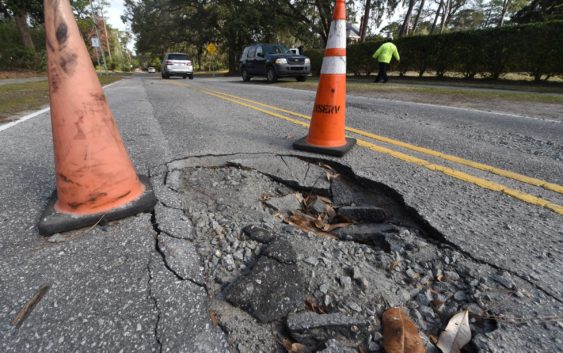- Western NC neighborhood still reeling from Hurricane Helene flood damage
- Ashe County Schools reopen after Hurricane Helene hit area over a month ago
- Ashe County Schools reopen Tuesday after Hurricane Helene hit area
- Carolina Hurricanes foundation donates $50,000 to rebuild Asheville hockey rink
- Stress, shelter, and safety: Hurricane Helene's effect on domestic violence victims in NC
Florence filled Wilmington's roads with potholes, sinkholes

Staff are preparing a contract to fix 80 locations around the city where stormwater pipes fell in
WILMINGTON — Since Hurricane Florence hit the Cape Fear region last September, driving has been a little — or a lot, depending on your swerving abilities — bumpier.
Within Wilmington, the preponderance of potholes has caused the average time of repairs to nearly double, said Dave Mayes, the city’s public services director.
But in about 80 locations throughout the city, Florence’s rains caused damage to stormwater pipes beneath the roads, causing prominent depressions that can be confused for potholes by most drivers. City staff, Mayes said, is preparing to put a contract out for bid that would see all of those locations repaired as part of the same project.
Sinkholes can be caused during heavy rains, when water fill the stormwater system, pressuring pipes’ joints. Florence, which dropped more than 2 feet of rain across the region, was among the heaviest rains in Wilmington’s history.
“It creates a suction around those joints,” Mayes said, “and if there’s a little bit of weakness around those joints — (for instance,) if it’s very old — that suction will cause material to come in to the pipes through those joints, and that’s what causes those sinkholes.”
As part of the project, city staff is creating a public map so citizens to track each location. Once the contractor begins work, Mayes believes the roads will take about four months to repair.
Mayes said it is difficult to estimate a price because of the variables around repairing stormwater pipes, including how deep the pipe is buried, its size and how much asphalt must be removed as part of the project. Repairs could, Mayes estimated, range from $2,000 to $30,000 at each location depending on those factors.
The city does plan to ask for Federal Emergency Management Agency (FEMA) funds for the sinkhole project.
Pothole repairs
Councilman Clifford Barnett, Sr., said he has received, effectively, a crash course in road repair, and now understands infrastructure beneath the road must be repaired before the surface can be smoothed out. As repairs are made, Barnett urged city staff to ensure they are being done equally across Wilmington.
“Keep aware of the entire city,” Barnett said, “because all of us got hit really bad.”
While the city is working toward repairing the stormwater locations, it is also filling in the more common potholes reported by members of the public.
Ideally, city staff would repair a pothole two to three days after it is reported, Mayes said. But staff have been dealing with so much damage to city roads that they are taking six to seven days to fill.
“We are not in ideal conditions right now,” he said, “simply because there’s so many of them.”
Across the region
The N.C. Department of Transportation (DOT) is responsible for much of the road network in Brunswick, New Hanover and Pender counties.
Robert Vause, DOT’s division maintenance engineer, said, “We do still have some sites across the division that we are still making repairs on.”
Lanvale Road, in New Hanover County, will be the site of one of those repairs, with an as-yet unscheduled replacement of the pipe beneath the road that will lead, Vause said, to a full closure. Elsewhere in the county, DOT will line a pipe beneath a part of South 16th Street and make repairs on four secondary roads.
In Brunswick County, DOT is working to repair East Boiling Spring Road, with the installation of a pair of 96-inch pipes and other repairs expected to last until April 12.
DOT is also trying to figure out a permanent repair for a location near the Boiling Spring Lakes end of N.C. 133 that was damaged during the storm. Division staff also is planning to repair two secondary roads in the county.
Remaining repairs also include three secondary roads in Pender County.
Asked how long it takes to repair a road, Vause said, “If it’s a minor issue, those can be repaired fairly quickly, but if it’s a major site, then it could take several weeks.”
Reporter Adam Wagner can be reached at 910-343-2389 or Adam.Wagner@GateHouseMedia.com.